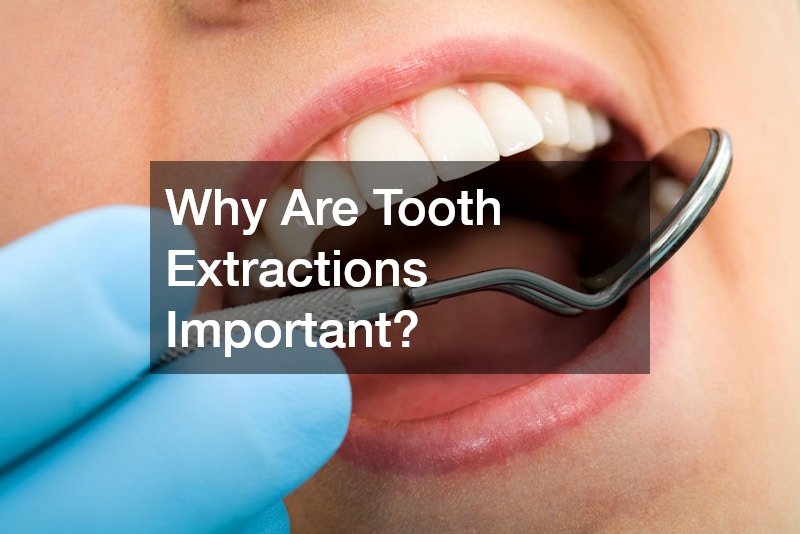Tooth extractions often evoke anxiety in dental patients, but this common procedure plays a vital role in oral health. While dentists generally prefer to preserve natural teeth when possible, there are situations where extraction is the best course of action. From preventing infection to improving alignment and supporting long-term wellness, tooth extractions serve a variety of purposes that go far beyond simply removing a problematic tooth.
In this article, we explore the many reasons why tooth extractions are important, what the process entails, and how they contribute to overall oral and systemic health.
Removing Severely Damaged Teeth
One of the most common reasons for a tooth extraction is severe decay or damage. When a tooth is broken, cracked, or extensively decayed beyond repair, saving it with a filling, crown, or root canal may not be viable.
Left untreated, the damaged tooth can become a breeding ground for bacteria, leading to infections that may spread to nearby teeth or even throughout the body.
By removing a severely compromised tooth, dentists eliminate the source of pain and prevent more serious health issues down the line. Extractions in these cases are both curative and preventive, stopping the spread of bacteria and protecting the rest of the mouth.
Preventing Infections
Tooth infections can have serious consequences if not treated promptly. An infected tooth may cause an abscess, swelling, fever, and significant pain. In some cases, especially when antibiotics and root canal treatment are not effective, extraction is the only way to fully remove the infection and allow the area to heal.
By performing a timely extraction, dentists protect patients from complications such as jawbone deterioration, sinus infections, and in rare cases, life-threatening systemic infections. It is a critical part of managing oral infections and preserving surrounding tissues.
Relieving Crowding
Tooth extractions are sometimes necessary to create space in the mouth. For patients with overcrowded teeth, especially those undergoing orthodontic treatment, strategic extractions may be recommended to make room for better alignment.
In these cases, dentists or orthodontists might remove one or more teeth to allow the rest to shift into their correct positions. This not only improves the appearance of the smile but also enhances function, making it easier to bite, chew, and maintain good oral hygiene.
Treating Gum Disease
Advanced gum disease, also known as periodontitis, can severely damage the tissues and bone that support the teeth. As the disease progresses, teeth may become loose or develop infections around the roots. In some cases, the bone loss is so extensive that the tooth cannot be saved.
Removing these teeth is important to prevent the spread of infection and to prepare the mouth for future restorative options such as dentures or implants. Tooth extraction in cases of advanced periodontal disease helps control the condition and improves the overall health of the gums and jawbone.
Removing Impacted Teeth
Wisdom teeth, or third molars, are a frequent source of dental complications. These teeth often become impacted, meaning they do not erupt fully or emerge at awkward angles due to lack of space. Impacted wisdom teeth can lead to pain, cysts, infections, and damage to adjacent teeth.
Even when they are not currently causing symptoms, many dentists recommend removing wisdom teeth as a preventive measure—especially in young adults—before they have the chance to cause problems. In this way, extractions help preserve the alignment of the rest of the teeth and avoid future complications.
Preparing for Dentures
For patients who are transitioning to full or partial dentures, or those planning to receive dental implants, extractions may be needed to remove remaining unhealthy or non-functional teeth. Ensuring the mouth is free of decay and infection is essential before fitting any type of prosthetic or implant-supported restoration.
In these situations, extractions are part of a broader treatment plan to restore a patient’s oral function, confidence, and quality of life. By creating a clean and stable foundation, extractions allow for long-term dental solutions.
Supporting Systemic Health
Oral health is closely connected to overall health. Research has shown that untreated dental infections and chronic inflammation in the mouth can contribute to systemic issues such as heart disease, diabetes, and respiratory infections.
In this context, tooth extractions can play a role in protecting general health. For medically compromised patients or those preparing for certain procedures like organ transplants or chemotherapy, removing problem teeth can reduce the risk of serious complications related to oral bacteria entering the bloodstream.
Minimizing Pain or Discomfort
Chronic dental pain can significantly affect a person’s quality of life. Whether it’s caused by an abscessed tooth, deep decay, or impaction, the discomfort can interfere with eating, speaking, sleeping, and daily activities. Extractions offer rapid relief from this kind of pain when other treatment options are no longer effective.
Though recovery from an extraction may involve temporary discomfort, the long-term benefit of pain elimination often outweighs the short-term inconvenience. For many patients, extraction is a gateway to better health and renewed comfort.
What to Expect at Your Appointment
While the idea of tooth removal can sound intimidating, the actual procedure is often quick and well-tolerated with the help of local anesthesia and sedation options. During the visit, your dentist or oral surgeon will carefully loosen the tooth and remove it using special instruments. The area is then cleaned and may be stitched or packed to support healing.
Post-extraction care includes rest, cold compresses, pain management, and avoiding certain foods or activities while the site heals. Most patients recover within a few days to a week. For more complex surgical extractions, such as impacted teeth, recovery may take a bit longer.
Replacing Extracted Teeth
In some cases, such as when a molar or visible front tooth is removed, replacement may be recommended to preserve function and aesthetics. Options include dental implants, bridges, and dentures. Leaving a space unfilled can lead to issues like shifting teeth, bite changes, and bone loss in the jaw.
Your dentist will discuss whether a replacement is necessary and help you choose the right option based on your needs and budget. Modern dentistry offers many ways to restore your smile after extraction.

